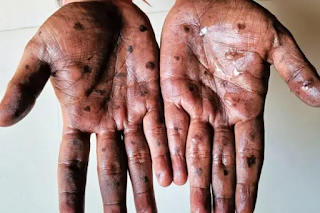Ghana has confirmed 14 new Mpox infections, raising the national case count to 133 as of late June 2025, according to the Ghana Health Service (GHS). The new cases were identified across multiple regions, although officials report that no deaths or hospitalizations have occurred in connection with the recent surge.
This increase follows a series of gradual case rises across the country. As of June 22, the confirmed Mpox cases stood at 119, indicating that the virus continues to spread, albeit moderately.
The GHS has reiterated its commitment to surveillance and public education as part of its strategy to contain the virus.
Mpox Cases Continue to Rise in Africa, Ghana
The situation in Africa reflects broader concerns about Mpox transmission in West African countries, where public health systems are already stretched thin due to other infectious diseases.
Mpox, formerly known as monkeypox, has been classified by the World Health Organization (WHO) as a public health emergency, particularly in endemic African regions.
The GHS has confirmed that it is working closely with regional health directorates to monitor the spread of the virus and to ensure timely responses in affected communities. So far, no region has reported an overwhelming surge, but the steady increase calls for ongoing vigilance.
Symptoms and Transmission: What to Watch For
Mpox typically begins with flu-like symptoms such as fever, headache, muscle pain, and swollen lymph nodes. A few days later, a rash may appear, often starting on the face and spreading to other parts of the body. The disease is generally mild but contagious, especially during the rash stage.
In Africa, Ghana, health experts have highlighted that the primary mode of transmission includes:
- Skin-to-skin contact
- Mouth-to-mouth or respiratory droplets
- Contact with contaminated materials (e.g., towels, clothing, bedding)
These modes make it particularly risky in close-knit households or during large social gatherings, which are common in many African communities.
Ghana Health Service Issues Preventive Guidelines
To reduce the risk of further spread, the Ghana Health Service has issued several preventive guidelines, urging the public to:
- Avoid physical contact with anyone showing Mpox symptoms
- Practice frequent hand washing with soap and water
- Refrain from sharing clothing, bedding, and utensils
- Report symptoms immediately to the nearest health facility
The GHS is also working to ensure community health volunteers are adequately trained to detect early symptoms and refer suspected cases quickly.
Regional and Global Context
Across Africa, the fight against infectious diseases like Mpox is compounded by limited resources, gaps in infrastructure, and inadequate access to testing and vaccines. In Ghana, health officials are prioritizing public awareness campaigns in both urban and rural areas to prevent a more significant outbreak.
The World Health Organization continues to support African countries with technical guidance and resources to respond to Mpox outbreaks. There are also ongoing efforts to study the virus more thoroughly in African populations, where it has been historically under-researched.
Outlook: Stay Vigilant, Stay Safe
Although the current outbreak in Africa, Ghana has not led to any deaths or hospitalizations, health officials stress that complacency is not an option. Public cooperation, early symptom reporting, and responsible social behavior will be critical in slowing down the spread of Mpox.
The GHS will continue to provide regular updates and encourages the public to rely on verified health sources for accurate information.


